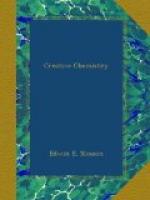Directly after graduating from the University of Chicago in 1896, I entered the employ of the largest coal-tar dye works in the world at its plant in Germany and indeed in one of its research laboratories. This was my first trip outside the United States and it was, of course, an event of the first magnitude for me to be in Europe, and, as a chemist, to be in Germany, in a German coal-tar dye plant, and to cap it all in its research laboratory—a real sanctum sanctorum for chemists. In a short time the daily routine wore the novelty off my experience and I then settled down to calm analysis and dispassionate appraisal of my surroundings and to compare what was actually before and around me with my expectations. I found that the general laboratory equipment was no better than what I had been accustomed to; that my colleagues had no better fundamental training than I had enjoyed nor any better fact—or manipulative—equipment than I; that those in charge of the work had no better general intellectual equipment nor any more native ability than had my instructors; in short, there was nothing new about it all, nothing that we did not have back home, nothing—except the specific problems that were engaging their attention, and the special opportunities of attacking them. Those problems were of no higher order of complexity than those I had been accustomed to for years, in fact, most of them were not very complex from a purely intellectual viewpoint. There was nothing inherently uncanny, magical or wizardly about their occupation whatever. It was nothing but plain hard work and keeping everlastingly at it. Now, what was the actual thing behind that chemical laboratory that we did not have at home? It was money, willing to back such activity, convinced that in the final outcome, a profit would be made; money, willing to take university graduates expecting from them no special knowledge other than a good and thorough grounding in scientific research and provide them with opportunity to become specialists suited to the factory’s needs.
It is evidently not impossible to make the United States self-sufficient in the matter of coal-tar products. We’ve got the tar; we’ve got the men; we’ve got the money, too. Whether such a policy would pay us in the long run or whether it is necessary as a measure of military or commercial self-defense is another question that cannot here be decided. But whatever share we may have in it the coal-tar industry has increased the economy of civilization and added to the wealth of the world by showing how a waste by-product could be utilized for making new dyes and valuable medicines, a better use for tar than as fuel for political bonfires and as clothing for the nakedness of social outcasts.
V
SYNTHETIC PERFUMES AND FLAVORS




